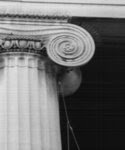Marc Engelmann, a Davenport, Iowa real estate attorney was found guilty of nine counts of wire fraud, bank fraud, and conspiracy on September 13, 2011. Engelmann filed a motion for a new trial based on his assertions that 1) the jury was confused regarding whether he acted in good faith, and 2) the investigating FBI agents were discussing the case during the trial.
The jury sent a question to the judge asking for more information on "good faith." The Judge responded that the instructions provided a clear definition of good faith, and the jury should refer to those instructions. Part of Engelmann's defense was that he acted in good faith that the lender was aware of the fraud scheme. He claimed that the closing agent was aware of the fraud, and therefore, he claims, the lender was aware. All of the employees of the closing agent testified that they were unaware of the kickback scheme. His own (former) real estate assistant testified that Engelmann told her not to discuss the kickback with the closing agent. He also prepared two closing statements--one which was marked "Numbers for HUD" and one which was marked "courtesy copy." The "Numbers for HUD" version was faxed to the closing agent, but it did not appear the "courtesy copy" was provided to the closing agent. The "Numbers for HUD" version did not show the kickback, while the "courtesy copy" did. As an experienced real estate attorney, he was certainly aware that the scheme was illegal, and if he believed the lender knew of the scheme and assented to it, he certainly should have had ample documentation in his file from the lender. No such documentation was presented at trial.
There was a clear and concise jury instruction defining good faith, which was taken from a set of model jury instructions. Engelmann wanted a more verbose version, though everything which was included in the verbose version was included throughout the rest of the jury instructions.
A long-time client of Engelmann's was apparently a spectator at the trial. This individual called the Judge after the trial. During a break, this individual claims he witnessed the two investigating FBI agents discussing the case. Normally, witnesses are not allowed to discuss the case prior to testifying. Obviously, it would not be appropriate for the closing agent employees and Engelmann's former assistant to get together to get their stories straight before testifying. These gentlemen, however, were the investigators. They talked to all of the witnesses. And they obviously talked with each other. Can you imagine Sgt. Friday not talking with Officer Gannon about the facts, ma'am? Pete Malloy and Jim Reed ignoring each other in Adam 12? Ponch and Jon with their fingers in their ears saying "la la la la I can't hear you?" In fact, one of the agents was present through the entire trial, and he also testified. The only reason the other agent was called to testify is that Engelmann denied telling the agents that he told them he knew the scheme was illegal when they first came to talk to him. To argue that two investigating agents cannot discuss a case on which they are working together is a bit of a stretch.
The motion was denied. His sentencing has been delayed until January 2012.
www.thomasmoens.com
Friday, November 18, 2011
Subscribe to:
Comments (Atom)

